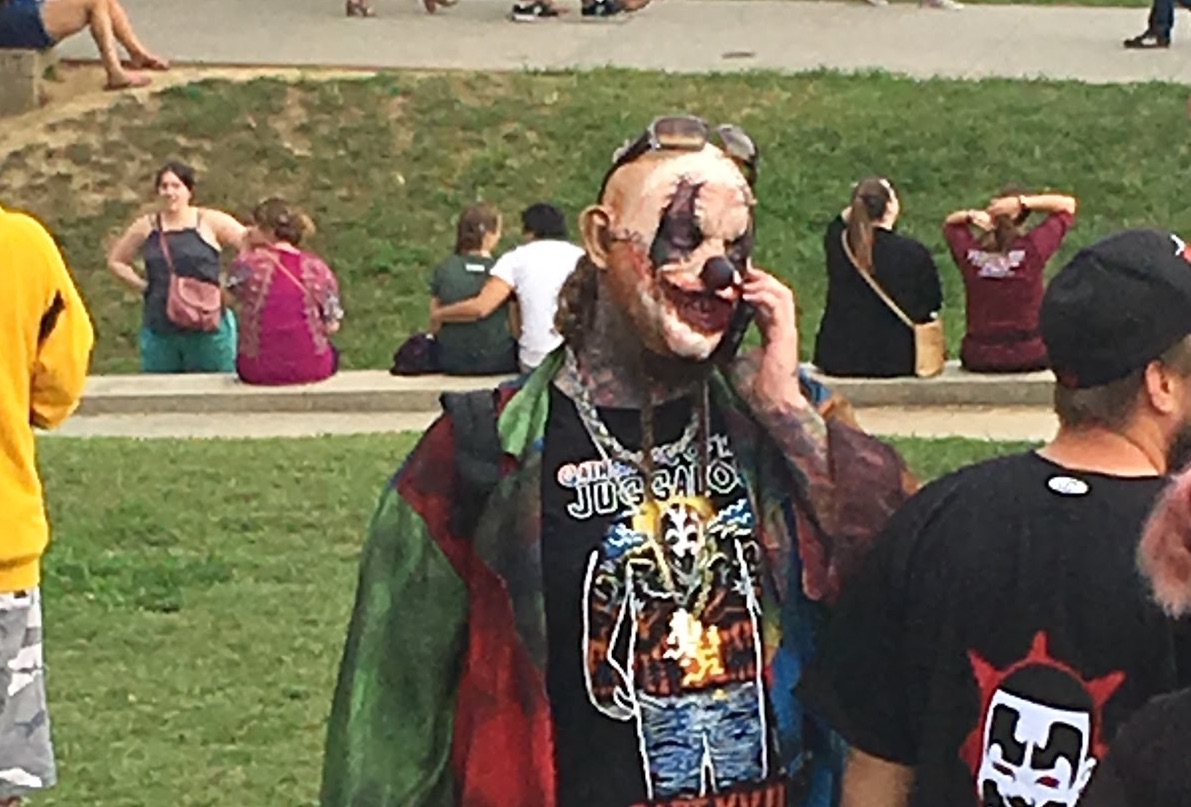What Are ‘Juggalos’ and Why Are They Marching Against the FBI?
On Saturday, the Juggalos marched on Washington. According to their website, they would “take our fight to the streets” this weekend to protest the FBI’s treatment of them. Which led a lot of people to ask, “What the heck is a Juggalo? And what’s their beef with the FBI?” The answer to these questions involves some interesting litigation over the FBI’s authority to identify gangs domestically.

On Saturday, the Juggalos marched on Washington. According to their website, they would “take our fight to the streets” this weekend to protest the FBI’s treatment of them. Which led a lot of people to ask, “What the heck is a Juggalo? And what’s their beef with the FBI?” The answer to these questions involves some interesting litigation over the FBI’s authority to identify gangs domestically.
First things first, who are the Juggalos? “Juggalos” are fans of the hip-hop duo Insane Clown Posse (ICP). Commentators liken them more to Deadheads than to an official, organized fan club. Juggalos are easily recognized by their signature look: clown-like face paint. The name  Juggalo comes from ICP’s 1992 song “The Juggla” and has evolved into a term of endearment among fans of the group. According to the ACLU, which represents the Juggalos and ICP in the litigation discussed below, the federal government estimates that there are more than a million Juggalos in the United States. This weekend’s protest involved smaller numbers—in the hundreds or low thousands, according to a best guess by Lawfare’s Benjamin Wittes, who went to this weekend's protest and took the photos published in this post.
Juggalo comes from ICP’s 1992 song “The Juggla” and has evolved into a term of endearment among fans of the group. According to the ACLU, which represents the Juggalos and ICP in the litigation discussed below, the federal government estimates that there are more than a million Juggalos in the United States. This weekend’s protest involved smaller numbers—in the hundreds or low thousands, according to a best guess by Lawfare’s Benjamin Wittes, who went to this weekend's protest and took the photos published in this post.
ICP was founded in 1991 by Violent J and Shaggy 2 Dope, a duo who began performing a hard-core style of hip-hop called horrorcore. Wikipedia describes this music genre as hip-hop “based on horror-themed and often darkly transgressive lyrical content and imagery.” The ACLU, with gentler terminology, describes the genre as using “very harsh language to tell nightmare-like stories with an underlying message that horrible things happen to people who choose evil over good.” Although the group may not fit mainstream tastes, ICP has released two platinum and five gold albums. Along with its record label, ICP holds an annual music festival, called the Gathering of the Juggalos. According to Billboard, the event, which is now in its 18th year, drew 20,000 people in 2010. This year, a solid 8,000 fans showed up.
The Juggalos are upset because, in a 2011 report, the federal government classified the group as a gang. Because of this report, the Juggalos say, members of their group have been the target of harassment by law enforcement. Individual members have also said that they have lost their jobs and custody of their children because of their affiliation with the group. In 2014, the group filed a lawsuit demanding that they be removed from the list. That case was dismissed last year, a decision that led to this weekend’s march.
The 2011 report is a product of the FBI’s National Gang Intelligence Center (NGIC), which every two years releases a National Gang Threat Assessment (NGTR), now called the National Gang Report. Congress established the National Gang Intelligence Center in 2005 to act as a repository for and facilitate the sharing of gang-related information and intelligence between federal, state and local law enforcement. State and local law-enforcement agencies voluntarily report data on the growth, migration, criminal activity and association of gangs to the center, which incorporates the information into the publicly available National Gang Threat Assessment.
In 2011, the center released a version of the report, and for the first and last time included the Juggalos, describing the group as a “loosely-organized hybrid gang.” In a one-page overview, the report noted that Juggalos were recognized as a gang in only four states but that at least 21 states had identified criminal Juggalo subsets.
The national report also described a group that was committing low-level crimes but warned that small numbers of Juggalos were becoming more organized and violent:
Most crimes committed by Juggalos are sporadic, disorganized, individualistic, and often involve simple assault, personal drug use and possession, petty theft, and vandalism. However, open source reporting suggests that a small number of Juggalos are forming more organized subsets and engaging in more gang-like criminal activity, such as felony assaults, thefts, robberies, and drug sales.
The report cites two specific examples of violence. In January 2011, a Juggalo member shot and wounded a couple in Washington, and in 2010, two Juggalos were charged with beating and robbing an elderly homeless man.
 According to NPR, Juggalos have been violent on at least two occasions since the 2011 report. In February of this year, a man in Wisconsin was sentenced for using a machete to cut off a woman’s finger and drinking her blood. In 2014, two Maryland men were charged with attempted murder after they tried to carve a Juggalo tattoo off their housemate’s arm before setting his arm on fire.
According to NPR, Juggalos have been violent on at least two occasions since the 2011 report. In February of this year, a man in Wisconsin was sentenced for using a machete to cut off a woman’s finger and drinking her blood. In 2014, two Maryland men were charged with attempted murder after they tried to carve a Juggalo tattoo off their housemate’s arm before setting his arm on fire.
The FBI’s action does not carry any legal weight. While the report classifies the Juggalos as a gang, that classification is not a designation that, say, parallels the government’s authority to designate a foreign terrorist organization, an action that makes “material support” of the designated group a felony. The action does not prescribe—or even recommend—any particular course of action. The NGTR is just an intelligence product, meant to educate and facilitate information sharing.
In terms of analogies, the report is probably more similar to the Office of the Director of National Intelligence’s Global Threat Assessment than to the State Department’s designation of foreign terrorist organizations.
That said, it’s not hard to understand why Juggalos—most of whom see themselves as nothing more than music fans—protest their inclusion. While they haven’t been included in the national gang report since the 2011 edition, the group continues to litigate its inclusion in that document.
In January 2014, the ACLU filed a lawsuit against the Justice Department and the FBI on behalf of four Juggalos and the two members of ICP (performers Violent J and Shaggy 2 Dope). The suit was filed in the Eastern District of Michigan, which covers ICP’s hometown. It alleged that the Juggalos, because of their inclusion in the National Gang Intelligence Center’s 2011 report, have been subject to harassment by law-enforcement officers. The complaint details the harassment: Several of the plaintiffs were repeatedly stopped and searched by law enforcement because of their Juggalo tattoos and clothing, it alleges. Another was told his application to join the U.S. military would be denied because of his Juggalo tattoo. And the two ICP performers complained that one of their concerts was canceled after local police called the venue and reported their alleged gang affiliation. The suit sought a declaratory judgement that federal designations of the Juggalos as a gang are unlawful.
The complaint alleged that the federal government’s designation of Juggalos as a “hybrid gang” violated the federal Administrative Procedure Act in several ways. First, the plaintiffs argued, the Justice Department and the FBI violated their constitutional rights of association, expression and due process under the First and Fifth Amendments, respectively. The plaintiffs also claimed that the agencies’ decision to classify Juggalos as a gang was “arbitrary and capricious.” Finally, they argued that the defendants violated criminal intelligence collection procedures.
The lawsuit began a winding path through the court system.
Initially, the lawsuit was dismissed in district court for lack of standing to bring the complaint. The court found that the federal government was not responsible for how local authorities use the National Gang Intelligence Center report because the assessment does not recommend any particular course of action for local law enforcement to follow. Because any adjudication on the merits would involve speculation about the decisions of third parties—for example, local law-enforcement agencies—the court found that the plaintiffs had not properly alleged constitutional standing.
But in September 2015 the U.S. Court of Appeals for the Sixth Circuit reversed the district court’s decision and reinstated the lawsuit, allowing the Juggalos’ claims to proceed because they asserted that the designation had caused them substantial harm.
One year later, in September 2016, the district court again dismissed the case. The court again reasoned that none of the consequences described in the complaint were caused by the defendants but were a result of “independent decision making by third parties.” In other words, the federal threat assessment document did not direct local law-enforcement officers to stop and search the plaintiffs. The court also ruled that the decision to include the Juggalos in the report was subject to agency discretion.
The case is on to its second appeal before the Sixth Circuit, and arguments are scheduled for October 11.






